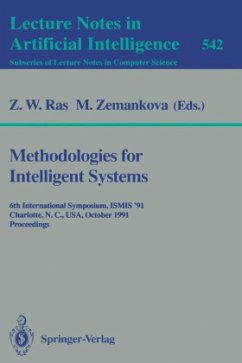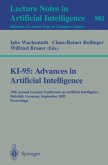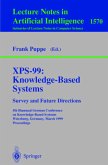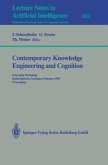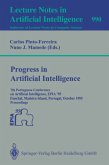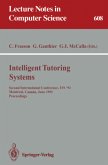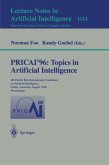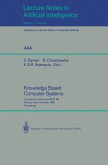Zbigniew W. Ras / Maria Zemankova (eds.)6th International Symposium, ISMIS '91, Charlotte, N.C., USA October 16-19, 1991. Proceedings
Methodologies for Intelligent Systems
6th International Symposium, ISMIS '91, Charlotte, N.C., USA October 16-19, 1991. Proceedings
Herausgegeben:Ras, Zbigniew W.; Zemankova, Maria
Zbigniew W. Ras / Maria Zemankova (eds.)6th International Symposium, ISMIS '91, Charlotte, N.C., USA October 16-19, 1991. Proceedings
Methodologies for Intelligent Systems
6th International Symposium, ISMIS '91, Charlotte, N.C., USA October 16-19, 1991. Proceedings
Herausgegeben:Ras, Zbigniew W.; Zemankova, Maria
- Broschiertes Buch
- Merkliste
- Auf die Merkliste
- Bewerten Bewerten
- Teilen
- Produkt teilen
- Produkterinnerung
- Produkterinnerung
This volume contains the papers selected for presentation at the Sixth International Symposium on Methodol- ogies for Intelligent Systems held in Charlotte, North Carolina, in October 1991. The symposium was hosted by UNC-Charlotte and sponsored by IBM-Charlotte, ORNL/CESAR and UNC-Charlotte. The papers discuss topics in the following major areas: - Approximate reasoning, - Expert systems, - Intelligent databases, - Knowledge representation, - Learning and adaptive systems, - Logic for artificial intelligence.
The goal of the symposium was to provide a platform for a useful exchange and…mehr
Andere Kunden interessierten sich auch für
![KI-95: Advances in Artificial Intelligence KI-95: Advances in Artificial Intelligence]() WachsmuthKI-95: Advances in Artificial Intelligence39,99 €
WachsmuthKI-95: Advances in Artificial Intelligence39,99 €![XPS-99: Knowledge-Based Systems - Survey and Future Directions XPS-99: Knowledge-Based Systems - Survey and Future Directions]() Frank Puppe (ed.)XPS-99: Knowledge-Based Systems - Survey and Future Directions39,99 €
Frank Puppe (ed.)XPS-99: Knowledge-Based Systems - Survey and Future Directions39,99 €![Contemporary Knowledge Engineering and Cognition Contemporary Knowledge Engineering and Cognition]() Franz Schmalhofer / Gerhard Strube / Thomas Wetter (eds.)Contemporary Knowledge Engineering and Cognition39,99 €
Franz Schmalhofer / Gerhard Strube / Thomas Wetter (eds.)Contemporary Knowledge Engineering and Cognition39,99 €![Progress in Artificial Intelligence Progress in Artificial Intelligence]() Pinto-FerreiraProgress in Artificial Intelligence39,99 €
Pinto-FerreiraProgress in Artificial Intelligence39,99 €![Intelligent Tutoring Systems Intelligent Tutoring Systems]() FrassonIntelligent Tutoring Systems77,99 €
FrassonIntelligent Tutoring Systems77,99 €![PRICAI '96: Topics in Artificial Intelligence PRICAI '96: Topics in Artificial Intelligence]() FooPRICAI '96: Topics in Artificial Intelligence77,99 €
FooPRICAI '96: Topics in Artificial Intelligence77,99 €![Knowledge Based Computer Systems Knowledge Based Computer Systems]() S. Ramani / R. Chandrasekar / K.S.R. Anjaneyulu (eds.)Knowledge Based Computer Systems39,99 €
S. Ramani / R. Chandrasekar / K.S.R. Anjaneyulu (eds.)Knowledge Based Computer Systems39,99 €-
-
-
This volume contains the papers selected for presentation at the Sixth International Symposium on Methodol- ogies for Intelligent Systems held in Charlotte, North Carolina, in October 1991. The symposium was hosted by UNC-Charlotte and sponsored by IBM-Charlotte, ORNL/CESAR and UNC-Charlotte. The papers discuss topics in the following major areas:
- Approximate reasoning,
- Expert systems,
- Intelligent databases,
- Knowledge representation,
- Learning and adaptive systems,
- Logic for artificial intelligence.
The goal of the symposium was to provide a platform for a useful exchange and cross-fertilization of ideas between theoreticians and practitioners in these areas.
- Approximate reasoning,
- Expert systems,
- Intelligent databases,
- Knowledge representation,
- Learning and adaptive systems,
- Logic for artificial intelligence.
The goal of the symposium was to provide a platform for a useful exchange and cross-fertilization of ideas between theoreticians and practitioners in these areas.
Produktdetails
- Produktdetails
- Lecture Notes in Computer Science 542
- Verlag: Springer / Springer Berlin Heidelberg / Springer, Berlin
- Artikelnr. des Verlages: 978-3-540-54563-7
- 1991.
- Seitenzahl: 660
- Erscheinungstermin: 25. September 1991
- Englisch
- Abmessung: 235mm x 155mm x 36mm
- Gewicht: 880g
- ISBN-13: 9783540545637
- ISBN-10: 3540545638
- Artikelnr.: 09244848
- Herstellerkennzeichnung
- Springer-Verlag KG
- Sachsenplatz 4-6
- 1201 Wien, AT
- ProductSafety@springernature.com
- Lecture Notes in Computer Science 542
- Verlag: Springer / Springer Berlin Heidelberg / Springer, Berlin
- Artikelnr. des Verlages: 978-3-540-54563-7
- 1991.
- Seitenzahl: 660
- Erscheinungstermin: 25. September 1991
- Englisch
- Abmessung: 235mm x 155mm x 36mm
- Gewicht: 880g
- ISBN-13: 9783540545637
- ISBN-10: 3540545638
- Artikelnr.: 09244848
- Herstellerkennzeichnung
- Springer-Verlag KG
- Sachsenplatz 4-6
- 1201 Wien, AT
- ProductSafety@springernature.com
An architecture for pragmatic voice interactive systems.- A logic of relative desire.- Methodologies for data/knowledge/information engineering: Will the twain meet?.- Personal learning apprentices.- The roles of artificial intelligence in information systems.- Integrating variables and operations into rule-based forward chaining systems.- The multi-player version of minimax displays game-tree pathology.- Generalization handling in a dynamic case memory.- Knowledge based semantic query optimization.- Combining knowledge bases consisting of first order theories.- User profiles for information retrieval.- An approach to deriving object hierarchies from database schema and contents.- Multilevel interface to a distributed database system.- Efficient evaluation of linear recursions with function symbols in deductive databases.- Synthesizing efficient agents from partial programs.- Knowledge extraction from databases: Design principles of the INLEN system.- Stable model semantics for probabilistic deductive databases.- Towards implementing valuation based systems with relational databases.- On the representation of continuous causal relationships.- Process transition networks: A formal graphical knowledge representation tool.- Using normal deduction graphs in default reasoning.- A model of information sharing for fault-tolerant flexible manufacturing systems.- On interval-based temporal planning: An IQ strategy.- Percept conceptualizations and their knowledge representation schemes.- Combining time points and time intervals in a hybrid knowledge representation formalism.- An analysis of property-flow view vs individual-flow view of inheritance.- Semantic extensions to text retrieval.- Updates with equality: Beyond the Herbrand universe assumption.- Using genetic algorithms toimprove the performance of classification rules produced by symbolic inductive methods.- Learning quantitative features in a symbolic environment.- Automatic acquisition of proper noun meanings.- Investigating the relationships between abduction and inverse resolution in propositional calculus.- Explanation-based learning helps acquire knowledge from natural language texts.- Hybrid pattern recognition system capable of self-modification.- Towards an adaptive information retrieval system.- Improving the comprehensibility, accuracy, and generality of reactive plans.- On the unknown attribute values in learning from examples.- A new system for inductive learning in attribute-based spaces.- Generation of classification rules.- Distance metrics for instance-based learning.- A study of crossover operators in genetic programming.- Input understanding as a basis for multistrategy task-adaptive learning.- Automated discovery of empirical equations from data.- Constructing models of hidden structure.- Amalgamated logic programming and non-monotonic reasoning.- WF 3: A semantics for negation in normal disjunctive logic programs.- Representation of mathematical knowledge.- Graded logics: A framework for uncertain and defeasible knowledge.- The strong semantics for logic programs.- Static Parallel Arc Consistency in constraint satisfaction.- Towards a theory of inductive logic programming.- Another view of autoepistemic logic and truth maintenance system.- Dynamic autoepistemic logic.- Nonmonotonic temporal reasoning: Persistence, justified causation and event minimization.- Novelty revisited.- Typicality constants and range defaults: Some pros and cons of a cognitive model of default reasoning.- Resolution and path dissolution in multiple-valued logics.- How well are non-horn clauses handled?.- Fully deadline-coupled planning: One step at a time.- Completeness for propositional logic programs with negation.- Disjunctive logic programs and constraint processing.- Note on resolution circuits.- A semantic analysis of monotonic inheritance with roles and relations.
An architecture for pragmatic voice interactive systems.- A logic of relative desire.- Methodologies for data/knowledge/information engineering: Will the twain meet?.- Personal learning apprentices.- The roles of artificial intelligence in information systems.- Integrating variables and operations into rule-based forward chaining systems.- The multi-player version of minimax displays game-tree pathology.- Generalization handling in a dynamic case memory.- Knowledge based semantic query optimization.- Combining knowledge bases consisting of first order theories.- User profiles for information retrieval.- An approach to deriving object hierarchies from database schema and contents.- Multilevel interface to a distributed database system.- Efficient evaluation of linear recursions with function symbols in deductive databases.- Synthesizing efficient agents from partial programs.- Knowledge extraction from databases: Design principles of the INLEN system.- Stable model semantics for probabilistic deductive databases.- Towards implementing valuation based systems with relational databases.- On the representation of continuous causal relationships.- Process transition networks: A formal graphical knowledge representation tool.- Using normal deduction graphs in default reasoning.- A model of information sharing for fault-tolerant flexible manufacturing systems.- On interval-based temporal planning: An IQ strategy.- Percept conceptualizations and their knowledge representation schemes.- Combining time points and time intervals in a hybrid knowledge representation formalism.- An analysis of property-flow view vs individual-flow view of inheritance.- Semantic extensions to text retrieval.- Updates with equality: Beyond the Herbrand universe assumption.- Using genetic algorithms toimprove the performance of classification rules produced by symbolic inductive methods.- Learning quantitative features in a symbolic environment.- Automatic acquisition of proper noun meanings.- Investigating the relationships between abduction and inverse resolution in propositional calculus.- Explanation-based learning helps acquire knowledge from natural language texts.- Hybrid pattern recognition system capable of self-modification.- Towards an adaptive information retrieval system.- Improving the comprehensibility, accuracy, and generality of reactive plans.- On the unknown attribute values in learning from examples.- A new system for inductive learning in attribute-based spaces.- Generation of classification rules.- Distance metrics for instance-based learning.- A study of crossover operators in genetic programming.- Input understanding as a basis for multistrategy task-adaptive learning.- Automated discovery of empirical equations from data.- Constructing models of hidden structure.- Amalgamated logic programming and non-monotonic reasoning.- WF 3: A semantics for negation in normal disjunctive logic programs.- Representation of mathematical knowledge.- Graded logics: A framework for uncertain and defeasible knowledge.- The strong semantics for logic programs.- Static Parallel Arc Consistency in constraint satisfaction.- Towards a theory of inductive logic programming.- Another view of autoepistemic logic and truth maintenance system.- Dynamic autoepistemic logic.- Nonmonotonic temporal reasoning: Persistence, justified causation and event minimization.- Novelty revisited.- Typicality constants and range defaults: Some pros and cons of a cognitive model of default reasoning.- Resolution and path dissolution in multiple-valued logics.- How well are non-horn clauses handled?.- Fully deadline-coupled planning: One step at a time.- Completeness for propositional logic programs with negation.- Disjunctive logic programs and constraint processing.- Note on resolution circuits.- A semantic analysis of monotonic inheritance with roles and relations.

